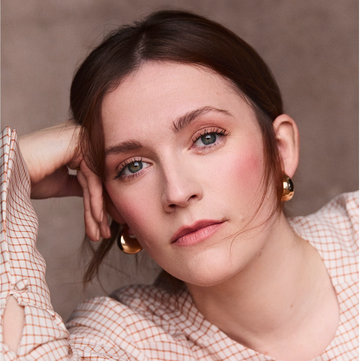The latest Bazaar Literary Salon was held at The Cadogan, a Belmond Hotel. In honour of the 250th anniversary of Jane Austen’s birth, our editor-in-chief Lydia Slater sat down with one of Austen’s most treasured literary descendants, Helen Fielding; whose 1996 novel Bridget Jones’s Diary delightfully updated the romantic classic Pride and Prejudice.
“She was probably the first novelist in the world who wrote real women,” said Fielding, who clutched a glass of champagne on stage whilst Lydia Slater brought along one of the hotel’s Bridget-themed drinks for the evening: ‘An Enormous Glass of Chardonnay’. “She wrote actual, real women dealing with the reality of their life when love and money was so intertwined. She's also terribly funny – her dialogue is so sparkly.”
A lifelong Austen fan, Fielding was also greatly inspired by the 1995 BBC adaptation of Pride and Prejudice. So much so that she borrowed its plot for the first novelistic appearance of Bridget Jones the following year. That in turn, of course, became the enormously popular 2001 film, Bridget Jones’s Diary, starring Reneé Zellwegger, Hugh Grant and Colin Firth – the original Mr Darcy himself – inhabiting the roles so perfectly that, for the four novels and four films that have since followed, even Fielding herself now imagines the characters as the actors who play them.
Fielding’s most famous creation began life as an anonymous and fictitious column in The Independent. “It was an era when we all wanted columns about single girls,” she remembers. “I said, I'll do it, but it's not going to be me. I'll make someone up. And I had this character in my head…” The column took aspects of Fielding’s life - the smug marrieds, the obsession with weight, the wonderful ‘urban family’ – and populated Bridget’s world with them. Though so much of Bridget was inspired by Fielding, the photograph which accompanied the column was not. “That was a secretary at The Independent called Susannah,” she said, with a laugh.
Bridget Jones has become a symbol of single womanhood in the 1990s and with it, the very era-specific fixations with single women in their thirties and, of course, body image. It is often a criticism levied at Fielding, that her depiction of this time is in some way anti-feminist. Fielding herself acknowledges her own obsession with weight back then (“Ridiculous! What was I thinking?”) but stressed that it serves as a sobering reminder of the societal mores of the time.
“When I wrote the first Bridget, women were dealing with a stereotype of being a single thirty-something. And at that stage in the Nineties, there'd been some hideous mistake if you were 32 and you weren't married, it was like, 'Are you Miss Havisham? You're on the shelf, you know?'” She said; “It's ridiculous when you look at it now, but it was really painful at the time.”
She continued to write Bridget Jones novels – all of which have been turned into successful films – but only when she felt she ‘had something to say.’ In this way, Fielding has grown with her audience; allowing dear ol’ Bridge to hold the hands of women at every stage of their life from singlehood to marriage and motherhood to widowhood. “Much like the single thirty-something label we battled back then, now I think the same thing is going on with older women – they are an old Biddy or a cougar,” she said. “But when women do age, what I see around me is that they don't suddenly grow into a universal type. What I see around me is women who are still vibrant and viable – still having relationships and sex and laughing.”
There is a Bridget for every woman and Fielding has, indeed, “something to say” to all generations. She admits that even her Gen Z daughter and her friends remind her of Bridget. “I did Cheltenham festival in October and a really big percentage of the audience, much more than ever was Gen Z, which was amazing,” she said. “I can see why they relate to Bridget, because they're emotionally authentic, nice. It's very touching the way they have all these little rituals that are very Bridget like to me, where Bridget would have like, the vodka, the ice cream, the pyjamas, they've got their protein powders and bedtime rituals that they've seen on Tiktok. It’s still the creation of their own cosy worlds.”
The success of Bridget Jones is evidently as powerful as ever. The most recent film, Mad About The Boy, outperformed the most recent Marvel movie and was a wonderful reminder of the eternal power of Fiedling’s iconic character. “What are the chances of just writing something so casually and secretly and then finding that so many people have related to it?” She said; “It also helped me, because I thought only I felt like that. It's funny that feeling of sort of insecurity that is shared by so many people. So even now, I can get days when I just think, oh my god, everything's terrible. I'm terrible and then I think, No way, no, I wrote Bridget Jones!”


















